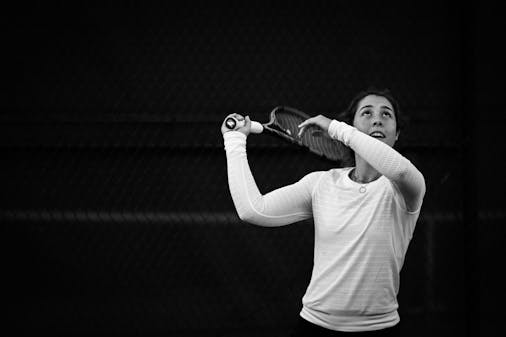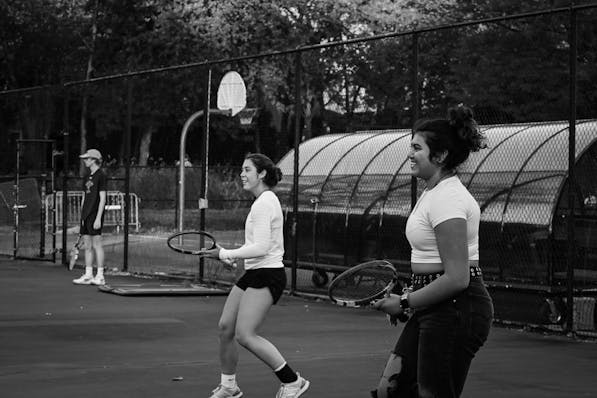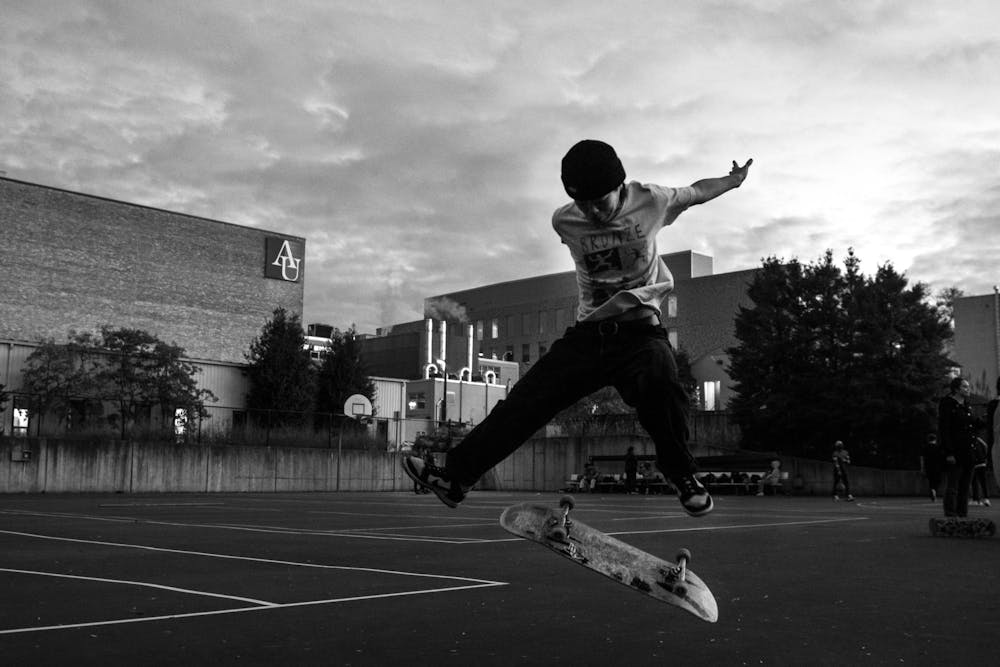From the Newsstands: This story appeared in The Eagle's December 2023 print edition. You can find the digital version here.
As part of American University’s 2021 campus plan, students can expect a new athletics facility: the Meltzer Center. The Center means more space and equipment for AU’s NCAA athletes — but it also means that some club sports are losing their community spaces.
The new Center will have upgraded facilities, available in addition to Bender Arena. The Meltzer Center is planned to be built where the University’s tennis courts and outdoor basketball courts are currently located. These spaces are vital to AU’s tennis and skateboarding clubs as well as local pickup games
Why is the Meltzer Center being built?
Alan Meltzer is a wrestling alumnus and member of the Board of Trustees. Meltzer and his wife, Amy, made a $5 million donation for the new athletics facility in July 2022. The Meltzer’s gift is in addition to a $3 million donation from fellow Board of Trustees member and University alumnus Jack Cassell and his wife, Denise.
“The goal is to make sure we have the appropriate facilities for students across the board rather than just the varsity student-athletes,” said David Bierwirth, the associate athletics director in charge of external operations. “And the general student body to have recreational space to add to the overall activity, health and wellness of the University.'”
The Center will house new facilities, including an outdoor turf called the “wellness court” that the Athletics Department hopes will be a new recreational space for the University community where students can play kickball, ultimate frisbee and other activities.
“There’s going to be more activity in the space than there is now,” Bierwith said.
However, these upgrades come with a price tag: valued community spaces. The tennis and outdoor basketball courts that reside on campus will all be taken over by the Meltzer Center.
When asked about the demolition of these spaces, Bierwirth emphasized the new opportunities that would come in place of them.
“As part of our planning, there are going to be moments where things are going to be temporarily or permanently gone,” he said. “Obviously, there is a trade-off in the type of activity but there is no question that [the Meltzer Center] is going to bring on additional opportunities for activity.”
Club Tennis
The club tennis team has one of the largest presences of any club sport on campus, with over 75 students trying out for the team this year. The program uses the tennis courts on campus to practice daily when in season.
Most club members learned of the demolition recently. Many planned to play next year without knowing that this fall would potentially be their last season. This has left the club without a plan for where to practice.

“There is no certainty that courts are available or affordable in the city, and the University could lend a hand with that,” said Kylie Finklestein, the captain for women’s club tennis and a sophomore in the Kogod School of Business. “The problem isn’t the project, it’s that the school is not offering a replacement.”
In a statement to The Eagle, Assistant Vice President for Community and Internal Communication Elizabeth Deal wrote that the University is “exploring any possible options for providing future tennis courts on the campus” and that officials have been meeting with members of club tennis “to determine the potential use of tennis courts off-campus.”
The AU Neighborhood Partnership also hosted information forums to hear concerns about the project, according to an email statement from University Spokesperson Jasmine Pelaez.
However, Jose Calvo, a senior in the College of Arts and Sciences and president of club tennis, said that “[officials] told us they didn’t have any plans to build tennis courts on campus.” Calvo said the club has been offered ideas for off-campus locations, but not an increase in funding to afford them.
“I think this is going to work as a temporary solution. Maybe for a semester, or a year. It’s expensive and difficult to practice off campus,” Calvo said.
Members of the club said they feel that the University’s decision prioritizes the aesthetics of Division I sports over community.
“I mean, as much as people would like to say that the University is there for us, it’s a business, and they are going to do what makes them money,” said Oliver Pasek, vice president of club tennis and junior in CAS.

The tennis court demolition also affects tennis classes. In an email to The Eagle, Tennis coach and instructor John Garrett wrote that the tennis program will be eliminated with the demolition of the courts, while also acknowledging the positive impact the new facility could have on American University.
“I have heard from many of my students how disappointed they are with this decision, but it’s all part of the overall progress at American University,” Garrett wrote. “There is a real need to upgrade the athletic facilities on campus, and with real estate at such a premium, something had to give.”
The team posted a petition on change.org Nov. 9 to save the tennis courts. The petition received more than 330 signatures in under 24 hours and states, “signing this petition is not just a vote of confidence for the team, but it’s a vote for the surrounding community.”
Skateboarding Club
The tennis community at AU is not the only community affected by the Meltzer Center addition. The Skateboarding Club uses the outdoor basketball courts for practice. The club is in its first semester and is made up of members who skateboard together every Tuesday.
Most members were surprised to learn that the courts were being demolished.
“I feel like AU knows this is an unpopular idea. They know that it’s not necessarily at the advantage of the student body,” said Joey Fournier, a junior in the School of International Service. “If they really thought it would benefit the community’s well-being I would think they would be more vocal about this project.”
Displacement from the courts will make it difficult for the club to find new practice locations.
“If these courts are gone, we will have to go 30 minutes off campus,” said Takumi Sugino, president of the club and a junior in CAS. “This was the best spot for people.”
Members of the club also emphasized the importance of this space for not just themselves, but for the other community members they see using it.
“It would be one thing if these courts weren’t being used,” Fournier said. “[But] you can come here anytime and always find people here.”
“It’s really nice to have this outdoor space. I think people just want to have fun playing basketball or tennis or skating here. There is not another place to do this on campus and not a lot of parks available nearby,” Sugino said. “We’re paying a lot to be here, we want facilities that are going to be used by everyone, not facilities that are prioritized for athletes at the cost of our own.”
Basketball for all
Sharing the outdoor basketball courts with the Skateboarding Club is a pickup basketball community. Students, alumni and community members use the courts to play almost every day.
The group wasn’t aware that the courts were being demolished until recently. For the pickup basketball group, this shared community space is especially important as Bender Arena only allows current students to use the courts for open play.
“We don’t have any other options to play. Since we aren’t current students, we’re not allowed in the gym,” Jordan Young, a Howard University alumnus who comes to AU to play, said. “If this court disappears we are effectively without a place for our group to meet.”
The pick-up basketball group shared similar sentiments with the other communities displaced by the Complex.
“It’s exclusion and building something that’s for a tiny share of the population,” Nathan Turner, a University alumnus said. “If you asked the student body what type of facility they would want, I think the answer would be different than an athletic complex.”
As the day to break ground on the Meltzer Center inches closer, the affected communities are coping with a lack of communication and necessary resources from the University. All community members shared a hope that AU will consider their input more in the future.
“AU needs to do a better job of asking the community what we think,” said John Harding, a sophomore in the College of Arts and Sciences. “Everything they do, everything they build, should be for us — their community.”
This article was edited by Abigail Pritchard. Copy editing done by Isabelle Kravis, Sarah Clayton, Luna Jinks and Emilia Rodriguez.





